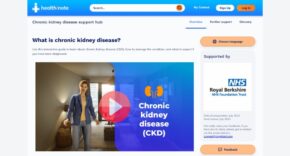
After a significant amount of research has shown that volunteers report improved wellbeing and mental health from charitable activities, charity leaders have outlined how further funding for ‘social prescribing’ initiatives, where doctors prescribe volunteering over medication, could massively benefit the not-for-profit sector and health services.
A study published by Shaping the Future with Volunteering showed that 80% of the 29,000 volunteers surveyed felt their lives had become more enriched since starting their charity work.
This has led to charity experts calling for ‘social prescribing’ to be utilised more in order to help with a person’s health and volunteer numbers for charities.
‘Social prescribing’ was introduced by the NHS after it was proven to be an effective alternative to medicine. It allows healthcare professionals to ‘prescribe’ services and volunteering to a patient to help boost their mental and physical health, as well as providing employability support, housing advice and addiction support.
Last year, the NHS further announced its £10m Volunteering for Health programme to deliver grant funding and tailored support for 15 organisations to develop new volunteering approaches.
Kathryn Hughes, volunteer programme manager at Epilepsy Action, said aside from the health benefits of social prescribing, it also helps to support the efforts of the charity.
She said: “As a large national charity, we have seen the rise and fall of volunteer numbers over recent years, especially as a result of Covid. The social prescribing of volunteering opportunities not only helps patients with their mental and physical health it provides them with new skills to aid employability. Furthermore it also helps charities to keep volunteer numbers consistent to continue providing vital services.
“Another challenge we face is that there are thousands of social prescribers across the country, and it is impossible to engage with them all to promote our volunteer opportunities and services. Software systems that can be used to enable us to promote our opportunities to a wider range of social prescribers will help us to focus our efforts on delivering services rather than marketing.”
The Access Group offers a tool within its software to help charities and other organisations to manage their social prescribing referrals, manage caseloads and secure funding.
Charity Action Together, which uses the software, described seeing a 65% reduction in GP appointments among their volunteers in one year, while gaps in recruitment also reduced.
Shaf Mansour, product manager at The Access Group’s not for profit division, believes many more charities and patients could benefit from social prescribing if there was more funding available.
He added: “Loneliness and isolation are major challenges facing the country as a whole and volunteering could play a huge role in relieving some of these challenges and removing a significant strain off the NHS. Charities can also feel the benefits of the After a significant amount of research has shown that volunteers report improved wellbeing and mental health from charitable activities, charity leaders have outlined how further funding for ‘social prescribing’ initiatives, where doctors prescribe volunteering over medication, could massively benefit the not-for-profit sector and health services.
A study published by Shaping the Future with Volunteering showed that 80% of the 29,000 volunteers surveyed felt their lives had become more enriched since starting their charity work.
This has led to charity experts calling for ‘social prescribing’ to be utilised more in order to help with a person’s health and volunteer numbers for charities.
‘Social prescribing’ was introduced by the NHS after it was proven to be an effective alternative to medicine. It allows healthcare professionals to ‘prescribe’ services and volunteering to a patient to help boost their mental and physical health, as well as providing employability support, housing advice and addiction support.
Last year, the NHS further announced its £10m Volunteering for Health programme to deliver grant funding and tailored support for 15 organisations to develop new volunteering approaches.
Kathryn Hughes, volunteer programme manager at Epilepsy Action, said aside from the health benefits of social prescribing, it also helps to support the efforts of the charity.
She said: “As a large national charity, we have seen the rise and fall of volunteer numbers over recent years, especially as a result of Covid. The social prescribing of volunteering opportunities not only helps patients with their mental and physical health it provides them with new skills to aid employability. Furthermore it also helps charities to keep volunteer numbers consistent to continue providing vital services.
“Another challenge we face is that there are thousands of social prescribers across the country, and it is impossible to engage with them all to promote our volunteer opportunities and services. Software systems that can be used to enable us to promote our opportunities to a wider range of social prescribers will help us to focus our efforts on delivering services rather than marketing.”
The Access Group offers a tool within its software to help charities and other organisations to manage their social prescribing referrals, manage caseloads and secure funding.
Charity Action Together, which uses the software, described seeing a 65% reduction in GP appointments among their volunteers in one year, while gaps in recruitment also reduced.
Shaf Mansour, product manager at The Access Group’s not for profit division, believes many more charities and patients could benefit from social prescribing if there was more funding available.
He added: “Loneliness and isolation are major challenges facing the country as a whole and volunteering could play a huge role in relieving some of these challenges and removing a significant strain off the NHS. Charities can also feel the benefits of the extra support as volunteer numbers increase.
“Funding is clearly a major obstacle for charities to implement these initiatives and, although the government has supported social prescribing efforts in recent years, there’s still much more that can be done to link the health and voluntary sectors.”
Shaf added: “Social prescribing is a great initiative and as more people choose volunteering to better their health, it’s important for charities to look at how to streamline their processes, to focus on engaging with their volunteers and ensuring their volunteer experience is perfect. Having the right systems in place ensures that everyone benefits.”
Find out more about The Access Group’s not-for-profit division and its Assemble solution.
extra support as volunteer numbers increase.
“Funding is clearly a major obstacle for charities to implement these initiatives and, although the government has supported social prescribing efforts in recent years, there’s still much more that can be done to link the health and voluntary sectors.”
Shaf added: “Social prescribing is a great initiative and as more people choose volunteering to better their health, it’s important for charities to look at how to streamline their processes, to focus on engaging with their volunteers and ensuring their volunteer experience is perfect. Having the right systems in place ensures that everyone benefits.”
Find out more about The Access Group’s not-for-profit division and its Assemble solution.












